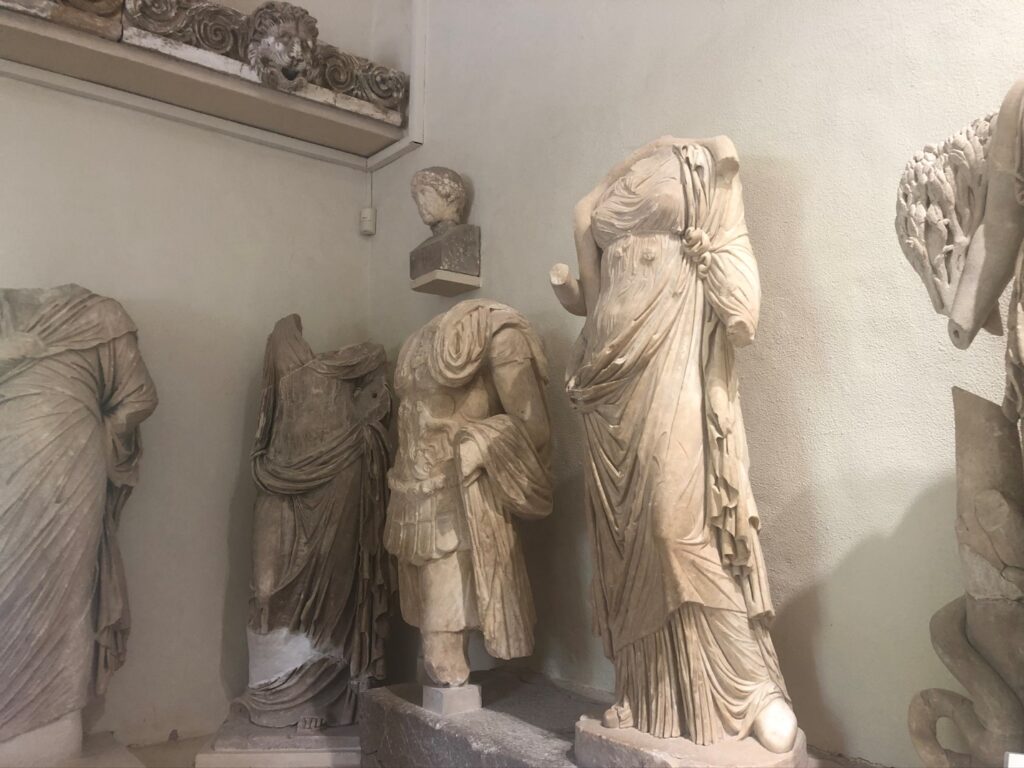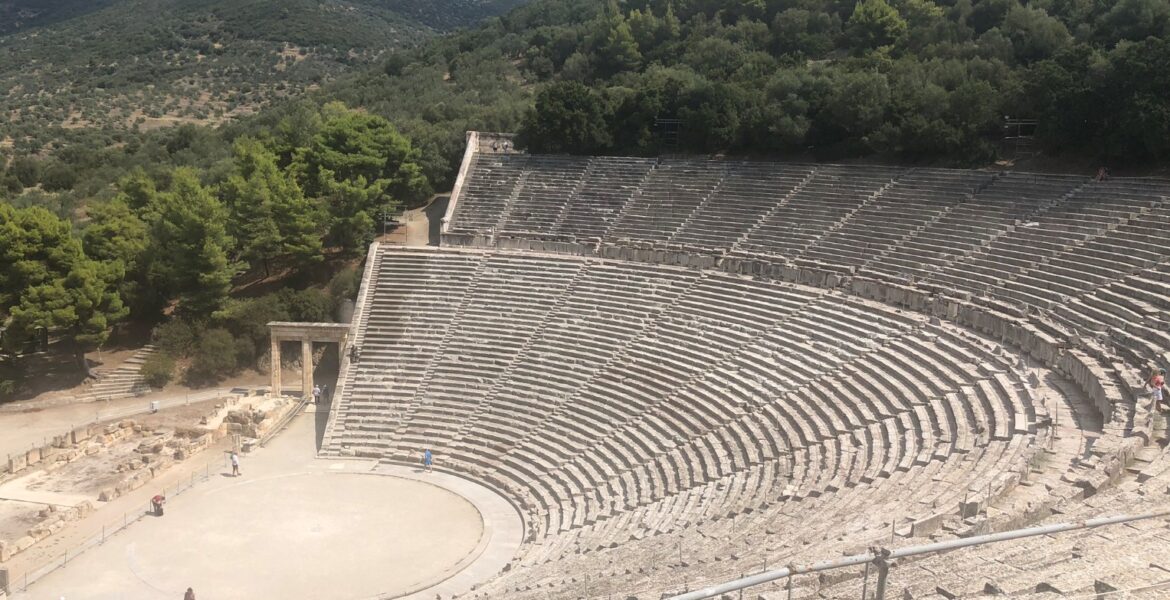“The Ancient Theatre of Epidaurus is the most perfect theatre in the world in terms of aesthetics and acoustics,” stated the University of Patras in its most recent study.
The Ancient Theatre of Epidaurus is the crown of cultural activity in Greece during the summer months and remains to this day one of the most important and globally recognizable monuments of antiquity.
Carved into the side of Mount Kynortio and dominating the southeastern end of the sanctuary, which was dedicated to Asclepius – the God and Creator of Medicine in Greek Mythology – the Ancient Theatre of Epidaurus has been characterized as the birth place of the art of theatre, and the genres of comedy, tragedy and drama.
A team of six professors from the University of Patras conducted extensive research on the ancient theatre and concluded that “the measurements confirm the theatre’s excellent acoustics and speech intelligibility, for all the typical listener positions tested.”
The study showed that in whichever seat someone sits within the theatre, either at the very front or at the last seat at the top of the theatre hill, they will be able to clearly hear the actors speak – who of course, never use microphones or any kind of sound boost equipment during plays.
The awe that someone feels once they enter the theatre is remarkable.
The natural echo of one’s voice can be heard from one end of the theatre to the other, a phenomenon that has long attracted the admiration of scientists, and even more so due to the fact that the Theatre of Epidaurus was built almost 2,500 years ago - a time when knowledge and technology were much more limited.
Playing at the Ancient Theatre of Epidaurus today is considered an incredible honour and career highlight, an achievement that is high on the bucket list of not just Greek actors but of the the most talented actors actors all around the world.
The theatre hosts mostly ancient Greek-style plays as well as contemporary adaptions of old plays and some musical events.
The performances can be in modern Greek, Ancient Greek or a mix of both, while there are very limited plays in different languages.
Some of the most famous and prestigious Greek movie stars have played in Epidaurus over the years, such as Melina Mercouri, Katina Paxinou, Alekos Alexandrakis, Manos Katrakis, Anna Synodinou, Kostas Kazakos, and of course the “national Greek star” Aliki Vougiouklaki.
Foreign directors of international acclaim, like American Robert Wilson and Belgian comedy-tragedy movie maker Ivo Van Hove have said that creating plays for the Ancient Theatre of Epidaurus was a “life goal”.
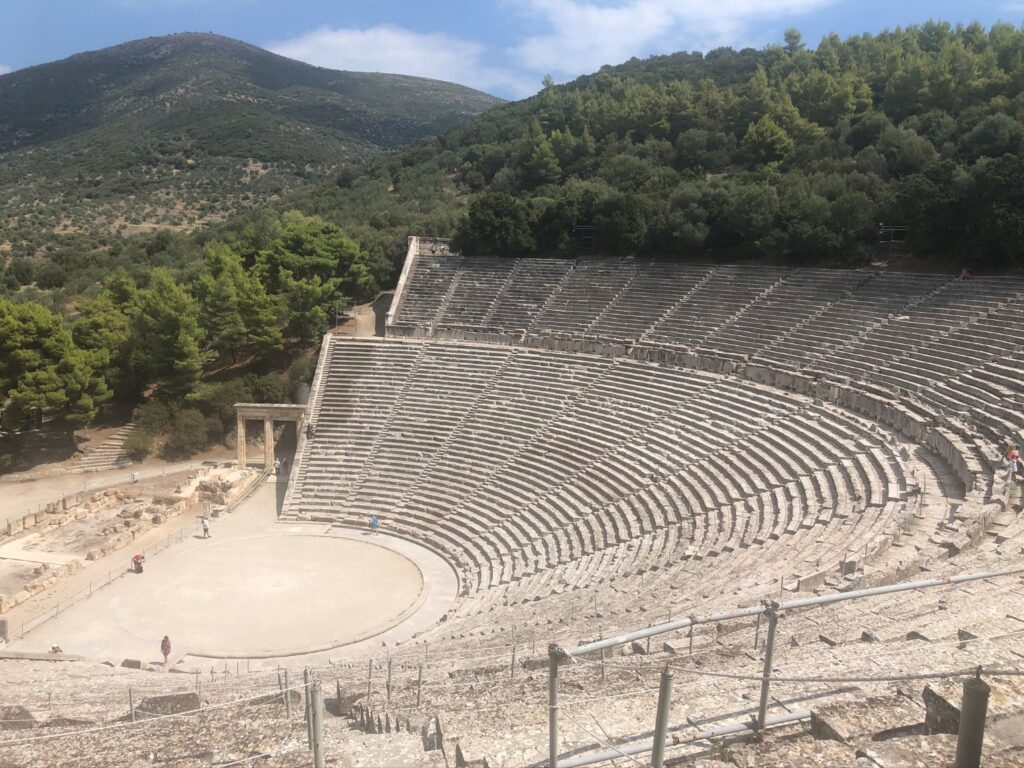
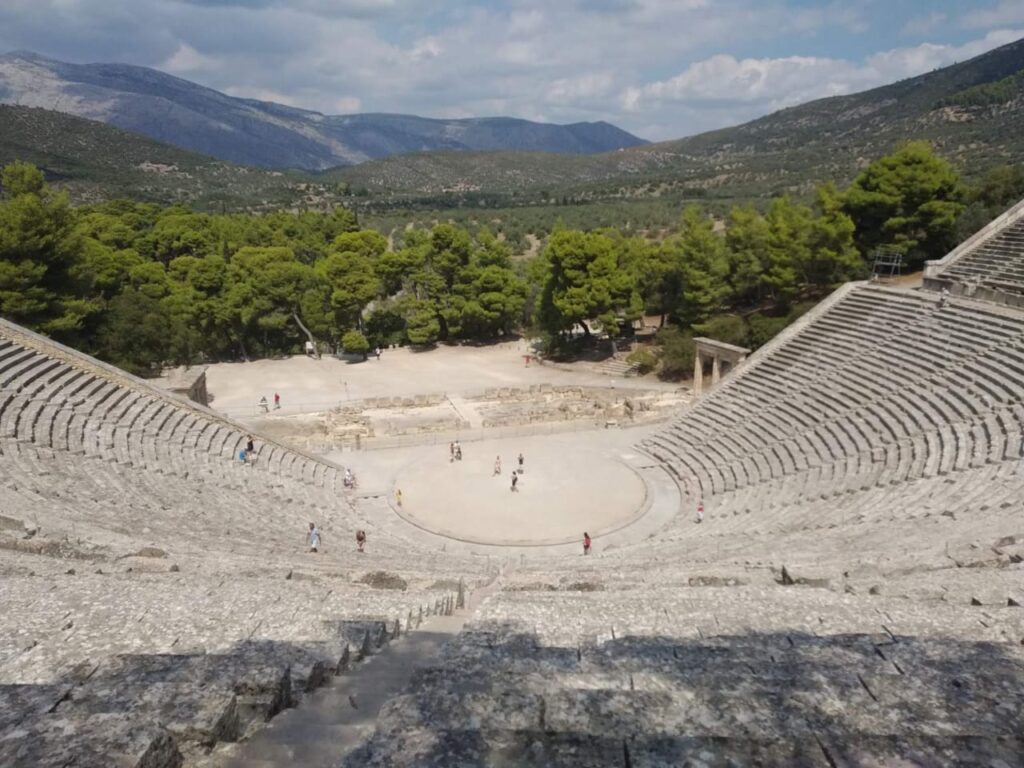
Since 1988, the Ancient Theatre of Epidaurus, along with all findings in the archaeological site of the sanctuary of Asclepius, have been added to the list of World Heritage Sites by UNESCO due to their significant influence and value to the world’s cultures and arts.
According to Greek traveller and geographer, Pausanias however, the story of the Epidaurus Theatre stars long before that during the 4th century BC.
Way back then, Pausanias praised the ancient theatre for its harmony and beauty, and attributed the creation of the largest dome pavilion theatre of classical antiquity to its architect, Polykleitos, who also designed the whole of Asclepius sanctuary.
The construction of the theatre was completed in two main construction phases and its capacity was initially for 13,000 – 14,000 people, making it the largest theatre at the time.
Musical and dramatic competitions were held in the monument, as part of the cult of Asclepius. Their goal was to create mental uplift as a means of healing for the people, who very much emphasized the importance of mental health, as a result of the combination of a healthy body and a healthy mind.
The archaeological sites of Epidaurus were damaged over the years by 'barbaric tribes', as Ancient Greeks used to call them, such as the Goths, but they were also harmed during the Byzantine times and the Ottoman Rule.
However, the Ancient Theatre of Epidaurus is still considered to this day the best-preserved theatre of antiquity.
A study by the Georgia Institute of Technology makes the observation that “the elusive factor that makes the ancient amphitheatre an acoustic marvel, is not the slope, or the wind — it’s the seats.”
The research adds that, “as the ancient Greeks were placing the last few stones on the magnificent theatre at Epidaurus, they couldn’t have known that they had unwittingly created a sophisticated acoustic filter.
"While many experts speculated on the possible causes for Epidaurus’ acoustics, few guessed that the seats themselves were the secret of its acoustics success, where audiences in the back row were able to hear music and voices with amazing clarity, unlike any other theatre.”

The architecture of the Epidaurus Theatre is not much different to that of most ancient Greek theatres, which are seen today as characteristic creations of Ancient Greek art.
The vast majority of ancient theatres are built on the slope of a hill, so that the slope of the ground favours the amphitheatre configuration of the space.
In Epidaurus, we can also find the characteristic three-part structure that Greeks used to build for its ideal appearance: the concave, the orchestra and the stage building.
The choice of location was a crucial element and, in addition to aesthetic enjoyment, it allowed the viewer not only to admire the natural environment, but it also was meant to serve worship or therapeutic purposes.
Georgia Tech experimented with ultrasonic waves and numerical simulations at the Epidaurus Theatre several times between 2013 and 2019, and discovered that “frequencies up to 500 Hz were held back while frequencies above 500 Hz were allowed to ring out. The corrugated surface of the seats was creating an effect similar to the ridged acoustics padding on walls or insulation in a parking garage.”
Leader of the study, professor Nico Declercq, explained that the audience could hear the lower frequencies of an actor’s voice “simply because the human brain is capable of reconstructing the missing frequencies through a phenomenon called virtual pitch."
"Virtual pitch helps us appreciate the incomplete sound coming from small loudspeakers (in a laptop or a telephone), even though the low (bass) frequencies are not generated by a speaker.”
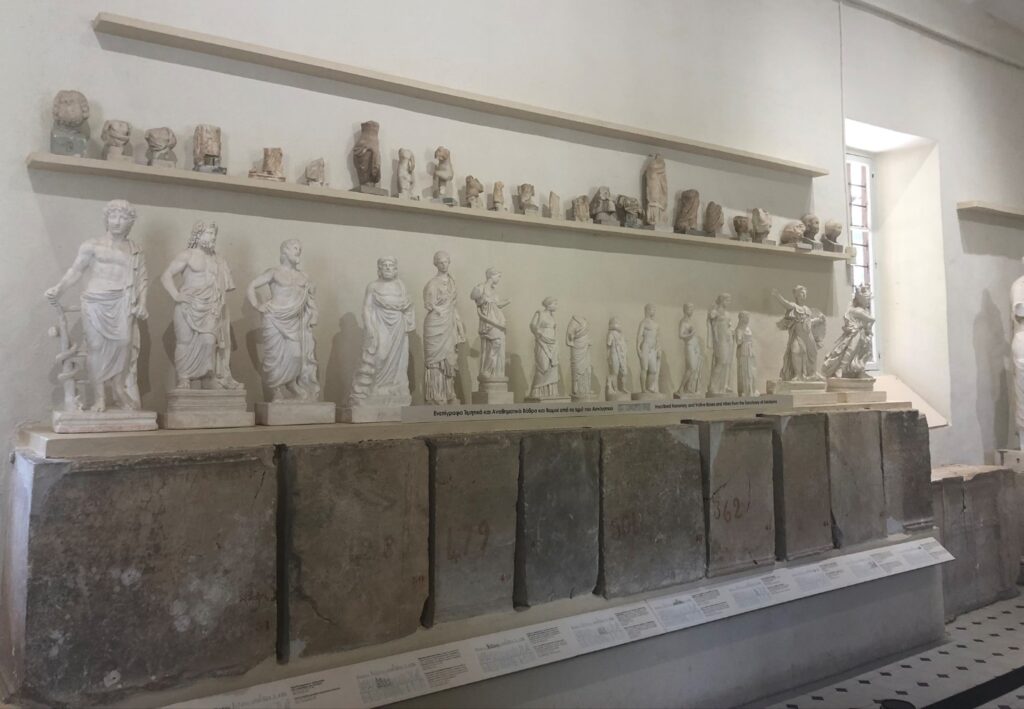
The first systematic excavation in the theatre began in 1881 by the Archaeological Society of Greece, and it took several years to complete, since the whole area of the hill was densely wooded and inaccessible.
Later, with the First and Second World Wars, all plans for the restoration of the theatre were cancelled, and it was not until the early 1950s that the Epidaurus Theatre came to life again.
The participation of the local community in the excavation program for the ancient theatre was equally crucial, as the inhabitants of Lygourio village in Epidaurus, gave up their estates, where the ancient monuments were located, so that the theatre could be resurrected.
Residents in the area also donated acres of fields so that a new road could be built to connect the sanctuary in Epidaurus with the first capital of Greece, Nafplio.
Apart from the Ancient Theatre of Epidaurus, the archaeological site of the area includes many more monuments of great importance, such as the Stadion – where sports events and competitions took place, the Gymnasium – the building where teenagers gathered to exercise, the Odeon – a place for mental and physical relaxation through music, called the first “rehab centre”, by many archaeologists today, along with the Epidaurus museum.
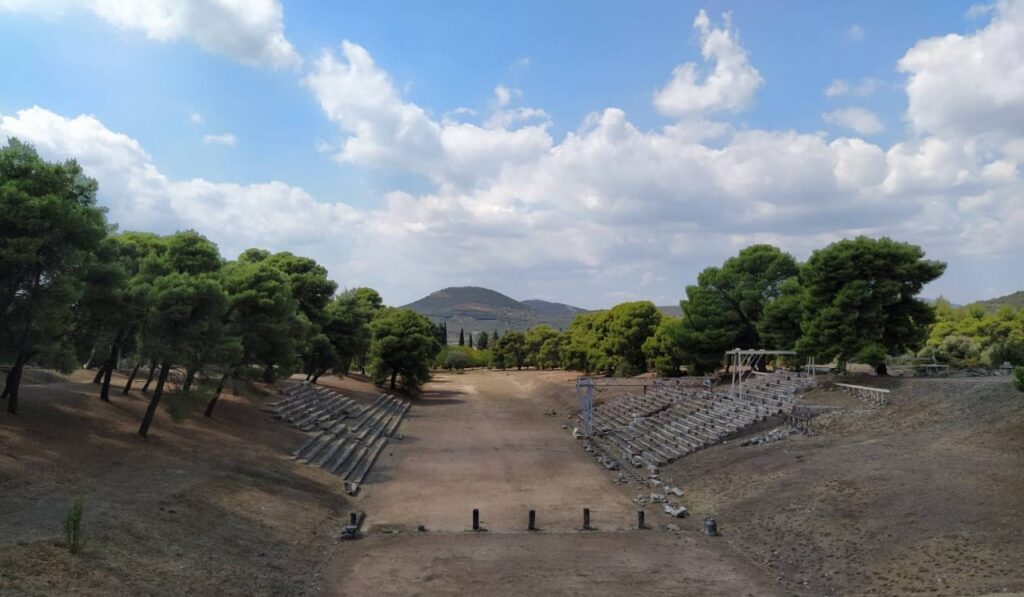
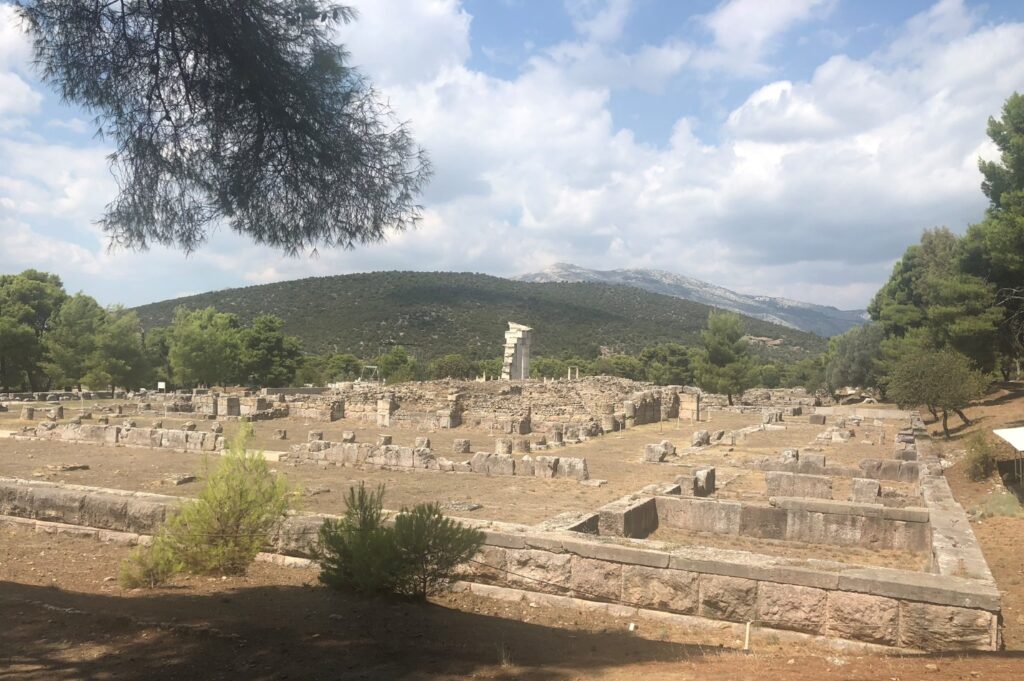

The city of Epidaurus itself is equally important, as it has become a popular tourist destinantion over the last few years due to its coastal location and numerous tourist attractions.
Earlier in 2020, Epidaurus was also praised by global media as the town that “beat COVID-19” since it reported zero cases of the novel coronavirus, and thus it continues every day to leave its significant mark on the world map, for a plethora of reasons.
